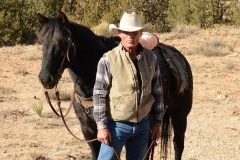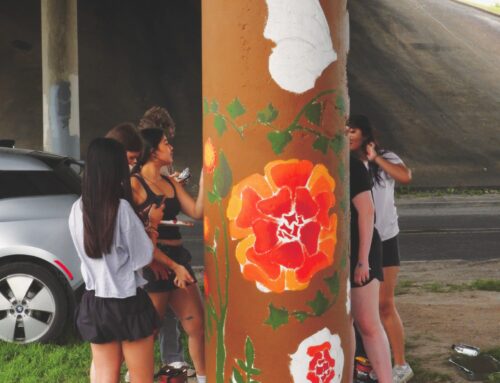My friend always talks about the difference between a movie and a film — the difference being that a movie is a flick created and enjoyed primarily for entertainment purposes, and film is created for artistic purposes, usually to dig into an issue, to challenge its audience and cause people to consider something from a different perspective.
I’m not a movie snob like my friend is, but I think it’s safe to say Frontera falls squarely in the “film” category. The beauty is that it does so without being obscure, boring and/or just plain weird. Actually, it’s very entertaining.
Frontera is an independent film created by actor and director Michael Berry, who visited Dallas on Friday to promote the film. It is part of the 44th USA Film Festival, which is taking place at the Dallas Angelika in Mockingbird Station through this weekend. The film will play tonight, April 27, at 7 p.m.
On Friday, Berry described the film as “a human story that takes place in the tumultuous area between the Arizona and Mexico boarder. A tragedy happens and a series of mistakes are made,” which — Berry admits — couldn’t have been more vague if he tried. So let’s go with the Facebook description, shall we? “After crossing the border illegally for work, Miguel (Michael Pena) finds himself wrongfully accused of murdering a former sheriff’s (Ed Harris) wife,” the description reads.
If that piques your interest, check out the rest of Advocate’s conversation with Berry:
Advocate: There are a lot of different themes that run through the film, the obvious one being the debate over illegal immigration. I thought it was interesting that you didn’t really take a stance with the film. You just showed different sides and let the viewers come to their own conclusions.
Berry: “That was exactly how I intended it. My goal in making this film, and a promise I made to my co-writer as well, was that I wasn’t going to lean too far one way or the other, because we’ve both lived there; we’ve experienced it. There’s treachery on both sides and there’s heroes on both sides. I’ve worked with some of the men who come across, and they’re like super heroes, and of course some of them are villains, but there are villains on our side, too. I think that’s the point of the film that I wanted to make, that this is a conundrum, and we have to figure something out. There are going to be some mistakes made, as with everything. There are a lot of sides to the story.
“Miguel to me, the character that Michael Pena plays, he’s like the men that I have known. He’s kind of a humble super hero. He can work harder, faster and better than almost anyone. He’s very honest, and even though he’s coming across illegally, he’s trying to find a better life for his family. But the people that we don’t want to come across are the human traffickers, or the people who break into people’s houses. My co-writer actually had his house broken into, and it was illegal immigrants who did that.
“If I’m trying to say anything through the film, it’s that rules and politics have to be second to humanity. I don’t know the answers to the problems. I just hopefully raise questions.”
Advocate: Where did the idea for the film originate?
Berry: “My buddy, who I’ve known for like 25 years now, he’s kind of my brother from another mother. His name is Louis Moulinet, and he grew up in Douglas, Arizona, where this kind of event could have/would have happened. It’s a border town where many, many Mexicans cross over, and where ranchers live on the land. There’s some spots where there’s a barbed wire fence and it’s, ‘this is America, and this is Mexico,’ like in the film. Sometimes there will be people walking over, and there will be ranchers who will run into them and tell them, ‘OK, you want to go this way to get to the road.’ They have contact with each other all the time.
“Now, if you recall in the film, there’s that section of the trail where there’s all that trash. They do that, where they discard things like diapers and clothing. That’s on someone’s land, and so some of the ranchers are very, very angry about that — probably rightfully so. They don’t want to carry those things, but sometimes they take off their clothes because it’s so hot during the day, and then it gets freezing at night and they freeze to death. So you see that out there, too.
“Anyways, Louis grew up in Arizona, and he started doing research about some twins that crossed back and forth to go to school in America. So that was the seeds for the film. Obviously the story is very different now, but a lot of the research came from that. The characters in it are based on a lot of people he has known, and same with me. Roy (Ed Harris) was based largely on my father.
Really? Tell me more about Roy, since he’s such a key character in the film.
“I desperately wanted Ed Harris to do it because he’s that type of actor. I honestly never thought I’d get him, but I wrote it with him in mind. Through the years, I’ve followed his career. I have an acting background, and I think every actor has someone that they sort of connect to. For me, it has always been Ed Harris. I watch him work, and I feel like he’s always truthful and believable. There’s a kind of passion mixed with a real reserve, which I think is fascinating to watch.
“I really wanted Amy Madigan to play his wife, Livy, in the film. Amy Madigan is really Ed Harris’ wife in real life. She is perfect for that role because she has the grace of a woman and the energy of a girl. I knew that her presence would be there the entire film, and I needed them to have a somewhat obvious relationship in the scope of about six lines, that their connection would be, ‘We’ve been married a long time, and I know you.’ So that when we lose her, we feel it. She was a very big deal for me to get.”
I thought this film was done on a very professional scale, especially for an indie film.
“It’s definitely an indie film, but I guess everything fell into place as far as the people working on it. I happened on a time when all the shows were on hiatus, and so I got all these unbelievably great people. Everything worked that way. I love indie films, and sometimes there’s a certain roughness to them that I find appealing, but I wanted this to be a certain way that it came together and moved quickly, so that we’d stay ahead of the audience.”






